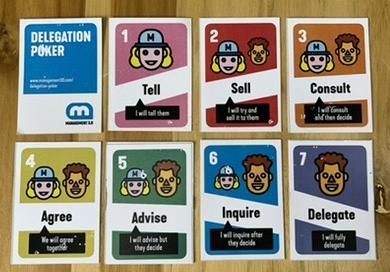Your team feels more like pawns than players. In their health check’s “pawns or players” question, they connected more with the sentence, “We are just pawns in a game of chess, with no influence over what we build or how we build it,” than with the alternative, “We are in control of our destiny! We decide what to build and how to build it.”
The “Pawns or players” question is all about autonomy. In general, you want to give your teams as much autonomy as possible while making sure they are set up for success. It can be a tricky balancing act.
You can adjust your teams’ level of autonomy by delegating authority. Basically, give some of the authority you have to the team. This can be a scary prospect, especially considering that most people think of delegation in boolean terms. But there is room for nuance, and using a tool like Management 3.0’s “Delegation Poker Cards” can help you.
Delegation Poker
The Delegation Poker Card deck is a simple tool. Seven cards that describe increasing levels of delegation.

- Tell - I will tell them
- Sell - I will try and sell it to them
- Consult - I will consult and then decide
- Agree - We will agree together
- Advise - I will advise, but they decide
- Inquire - I will inquire after they decide
- Delegate - I will fully delegate
You can use the cards to identify your current delegation level and plan how to get to a higher level.
Delegation Retrospective
Use the cards to reflect on the level of delegation you used in the past. List a few decisions or projects and set the level of delegation that you used. Now, think about what would have needed to be different for you to move up to the next level of delegation.
The specifics will depend a lot on the reality of your team, but you can start with the two reasons below and expand your list.
Your team may lack specific skills
If you didn’t use a higher level of delegation due to a lack of skills in your team, you can use the Delegation Pocker deck to have a career development conversation.
You can explain the concept of the Delegation Pocker and share your intention of giving the team more autonomy. From there, you can use a specific example to illustrate how you can increase your level of delegation if the team develops skill X.
You may need to trust your team more
If the reason wasn’t a lack of skills, there is a good chance that some of your fears prevent you from giving your team more autonomy.
Try finding a safe setting to give your team a lot more autonomy than you are currently comfortable with. If your team surprises you positively, continue to build on the trust created. If it doesn’t work out, you have more data to inform your next steps.